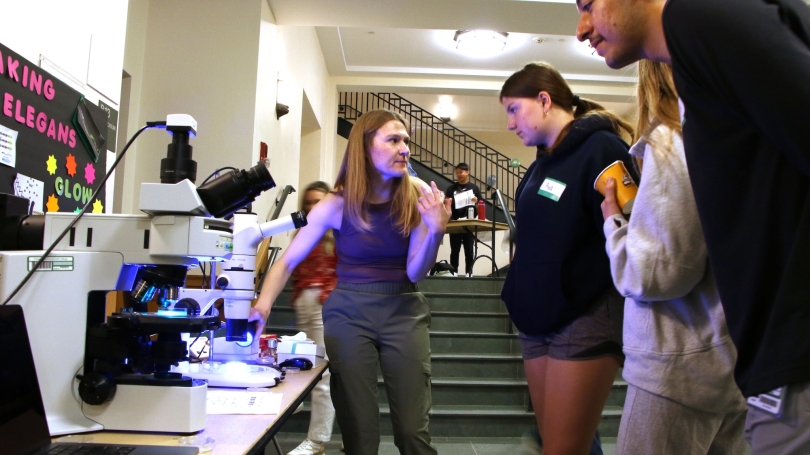
Kelli Cannon, a postdoctoral researcher in Dipon Ghosh’s lab, presenting to Brain Bee participants.
The annual event invites students ages 13 to 19 to dive into brain science through hands-on activities and friendly competition.
On Saturday, May 3, high school and middle school students from across New Hampshire and Vermont gathered on the Dartmouth campus for the Upper Valley Brain Bee–a day dedicated to making neuroscience fun, accessible, and engaging for teenagers.
Organized by Guarini graduate students Jessa Burling and Aine Scholand, both first-year doctoral students in the integrative neuroscience program, the event combined a lively neuroscience fair with an academic competition designed to challenge students' understanding of the human brain.
This year's Brain Bee was made possible by a team of around 25 volunteers, including graduate students and principal investigators. Graduate students volunteered their time to staff engaging demonstration booths and share their passion for neuroscience, while faculty members served as judges for the competition.
"It became such an incredible bonding experience seeing so many scientists sacrificing precious time out of their schedules to leave a positive impact on these young students," said Scholand. "It made me feel so grateful to see such a display of community come together to help make science more accessible and exciting."
"Community outreach and encouragement of learning are a major part of being a scientist," said Burling. "Dartmouth is such a hub of knowledge, and this is something that should be shared widely and easily accessible.
The two-part Brain Bee competition kicked off with a preliminary round that included written questions, a neuroanatomy practical exercise, and case-based diagnosis challenges. The event concluded with a lightning round of questions. Reya Satam, a student from Phillips Exeter Academy, secured first place and will be advancing to the National Brain Bee in 2026.
The day also featured a keynote address by Dr. Wilder Doucette, an assistant professor of psychiatry, who discussed how non-invasive techniques, such as electroencephalograms (EEGs) can help find brain activity patterns that may predict how individuals respond to mental health treatments.
Thanks to the dedicated organizers, enthusiastic volunteers, and engaged student competitors, the Upper Valley Brain Bee continues to spark interest in the brain sciences and inspire the next generation of neuroscientists.